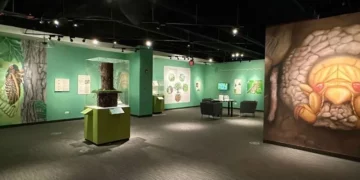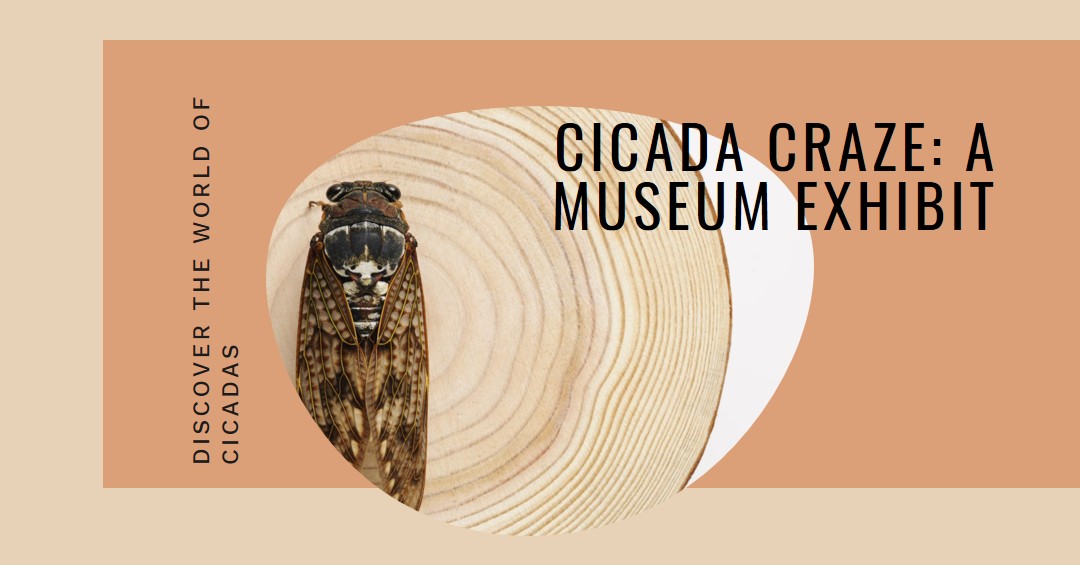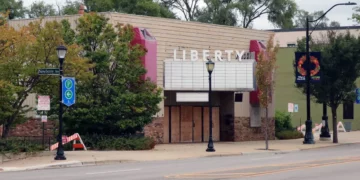Dunn Museum in Libertyville, IL Showcases Unique Cicada Exhibition
The Dunn Museum in Libertyville, Illinois, is preparing to unveil a unique exhibition that explores one of nature’s most fascinating phenomenons: the emergence of the 17-year periodical cicadas. Known for their coordinated life cycles and cacophonous mating songs, these cicadas spend most of their lives underground, only to emerge in vast numbers after seventeen years. The exhibition, titled “Celebrating Cicadas,” will offer museum-goers an insightful look into the life and impact of these extraordinary insects from April 27 through August 4.
Accompanying the sounds and sights of the cicada emergence, the “Celebrating Cicadas” exhibition is set to capture the public’s imagination through a blend of scientific exploration and cultural significance. The Dunn Museum is renowned for providing engaging and educational exhibits that delve into natural and historical topics, making it an ideal venue for presenting this natural spectacle to a diverse audience.
Beyond the cicada exhibition, the Dunn Museum holds a reputation for hosting various special exhibits that resonate with both local history and broader themes. From photographic journeys along the Underground Railroad to the illumination of Lake County’s racing heritage, the museum serves as an educational pillar in Libertyville, continually offering new and enriching experiences to its visitors.
Overview of Dunn Museum
The Bess Bower Dunn Museum of Lake County, located in Libertyville, Illinois, serves as a cultural repository and educational center. Named in honor of Lake County’s first official historian, Bess Bower Dunn (1877-1959), it operates under the governance of the Lake County Forest Preserves.
| Address | 1899 West Winchester Road, Libertyville, IL 60048 |
|---|---|
| Phone | 847-968-3400 |
The museum prides itself on connecting visitors with the history and cultural significance of the region. Its exhibitions, which vary from national touring exhibits to those curated by the museum staff, aim to both educate and captivate audiences.
One distinct aspect of the museum is its dedication to showcasing natural phenomena, such as the periodical emergence of cicadas. The museum occasionally coordinates special exhibitions that align with such natural events, providing a unique platform for community engagement with the environment.
The Dunn Museum’s role extends beyond mere exhibition space. It stands as a testament to regional history, shedding light on past societal attitudes like those towards antislavery. The museum’s commitment to historical accuracy and educational excellence makes it a cherished institution within Lake County.
History of Cicadas
Cicadas are ancient insects that have been part of the global ecosystem for at least 265 million years, evidenced by fossil records. Periodical cicadas, distinct from the more common annual cicadas, reappear in specific regions every 13 or 17 years in a compelling natural display.
Periodical cicadas spend the majority of their life cycle underground as nymphs, feeding on the xylem fluids from the roots of deciduous trees. After maturing, they emerge synchronously in astonishing numbers, driven by an internal biological clock and external temperature cues. The appearance of these insects is an adaptation strategy, known as predator satiation, where their sheer numbers overwhelm predators, ensuring the survival of the species.
Listed below are the two primary brood types found in North America:
- Brood XIII (13-year cycle): Known as the Northern Illinois brood, emerges mostly in Illinois, as well as parts of Iowa, Wisconsin, and Indiana.
- Brood XIX (17-year cycle): Also called the Great Southern brood, emerges in several Eastern, Midwestern, and Southern states.
Illinois plays host to both the 13-year and 17-year cicadas, with the next large emergence scheduled for 2024. This exciting natural event attracts enthusiasts and researchers alike, including those at the Dunn Museum in Libertyville, where a special exhibition celebrates this remarkable life cycle.
Significance of Cicadas in Culture
Cicadas have resonated through various cultures for centuries due to their unique life cycles and the overwhelming presence when they emerge. These insects are not merely biological phenomena; they also hold significant positions within folklore, symbolism, and art.
In Ancient Greece, the cicada was a symbol of resurrection, immortality, and spiritual upliftment, as it emerged from the ground, casting off its old self. The Chinese culture often views cicadas as emblems of rebirth and immortality as well; jade amulets in the shape of cicadas have been found in numerous burial sites.
Literature also reflects the cultural importance of cicadas. The insects often appear in poetry and prose as harbingers of the sultry haze of summer. Their distinct song is intertwined with themes of change and the passage of time.
Musical Influence:
- Folk songs celebrate the cicada’s song as part of the natural symphony of the outdoors.
- In modern music, cicadas’ rhythmic chirping is sometimes sampled to create a sense of atmosphere and place.
Throughout their appearances in global cultures, cicadas symbolize transformation and the beauty of life’s cyclical nature. They serve as a reminder of the interconnectedness of all life forms and the environment itself. As periodic events like the 17-year cicada emergence captivate people worldwide, cultural interpretations continue to evolve, adding to the rich tapestry of meanings behind these remarkable insects.
Exhibition Details
The Dunn Museum in Libertyville, Illinois is set to house a special exhibition entitled “Celebrating Cicadas,” highlighting the 17-year periodical cicada emergence.
Themes and Highlights
“Celebrating Cicadas” is a themed exhibition that focuses on the periodical cicada Brood X emergence. The event occurs once every 17 years, attracting interest and curiosity. The highlight of this exhibition is the natural phenomenon that encompasses the life cycle of cicadas and their role in the ecosystem.
Interactive Displays
The exhibition includes interactive displays that engage visitors of all ages. These displays are designed to provide a hands-on experience, helping guests understand the intricacies of cicadas’ lives.
- Sounds of Cicadas: An auditory installation that immerses visitors in the symphony of cicadas.
- Cicada Lifespan: Interactive booths illustrating the stages of cicada development from nymph to adulthood.
Artifacts and Specimens
Guests will have the opportunity to view authentic cicada specimens, including:
- Exoskeletons: Preserved exoskeletons showcasing the molting phase.
- Photographic Documentation: High-quality images capturing cicadas at various stages and natural settings.
Artifacts are curated to provide a comprehensive look at cicada biology and their significant emergence events.
Visitor Information
The Dunn Museum in Libertyville, Illinois, is hosting a special Cicada exhibition, welcoming visitors to explore this spectacular natural event. Below is essential information to ensure a smooth and informative visit.
Admission Times and Fees
- Adults: $10.00
- Seniors (62+): $6
- Youth (ages 4-17): $6.00
- Children (3 and under): Free
- Museum Members: Free
Hours:
- Tuesday: 10 am – 4:30 pm
- Thursday: 10 am – 4:30 pm
- Additional days and hours may vary; visitors should verify the schedule before planning their visit.
Location and Directions
- Address: Bess Bower Dunn Museum of Lake County, 1899 West Winchester Road, Libertyville, IL 60048
- Directions: The museum is accessible via major roadways and public transportation. Visitors are advised to use GPS or a map service for accurate directions from their starting location.
Museum Services and Amenities
- Accessibility: The Dunn Museum is fully accessible to visitors with disabilities.
- Parking: Ample free parking is available onsite.
- Refreshments: A café area is available with vending machines.
- Visitors can enjoy convenient amenities designed to enhance their museum experience.
Educational Programs
The Dunn Museum in Libertyville offers a robust schedule of educational programs in conjunction with their special exhibition “Celebrating Cicadas.” These programs are designed to enhance public understanding of the 17-year cicadas and their role in the ecosystem.
Workshops and Lectures
- Workshop Series: Participants can join thematic, hands-on workshops focusing on cicada biology and the unique characteristics of the 17-year periodical cicadas.
- Lecture Events: Experts deliver insightful talks on various topics related to cicadas, providing attendees with in-depth knowledge of these fascinating insects.
Guided Tours
- Exhibit Tours: The museum provides guided tours of the “Celebrating Cicadas” exhibition, offering a deeper dive into the displays and interactive installations.
- Field Walks: In addition to indoor experiences, the museum organizes guided field walks to observe cicadas in their natural habitat within the Lake County Forest Preserves.
Future Exhibitions
The Bess Bower Dunn Museum of Lake County is hosting a remarkable exhibition titled “Celebrating Cicadas”, showcasing the extraordinary life cycle of periodical cicadas. This event runs from April 27 to August 4, 2024, aligning with the emergence of these unique insects. Visitors will get insights into the 17-year life cycle of cicadas, which occurs with clockwork precision.
Additionally, on May 2, 2024, from 5:00 pm to 6:00 pm, the museum invites guests to the special event, “Cicadas of Lake County”. This event promises a deeper understanding of the local cicada population and their significance to the Lake County ecosystem.
Following the cicada exhibition, the museum is set to welcome another exciting reveal. Starting on October 7, 2023, through January 15, 2024, the venue will feature “Dinosaurs: Fossils Exposed”. This exhibition will display an impressive collection of dinosaur bones and fossils, allowing a peek into the ancient past.
| Upcoming Exhibition | Start Date | End Date | Highlights |
|---|---|---|---|
| Celebrating Cicadas | April 27 | August 4 | Periodical cicada emergence |
| Cicadas of Lake | May 2 | May 2 | Focus on local cicada population |
| Dinosaurs: Fossils | October 7 | January 15 | Dinosaur bones and fossils display |
Each exhibition aims to provide an educational and engaging experience for museum-goers, with detailed displays and information curated by experts in the field. The Dunn Museum continues to be a pivotal institution for learning and discovery in Libertyville, Illinois.










